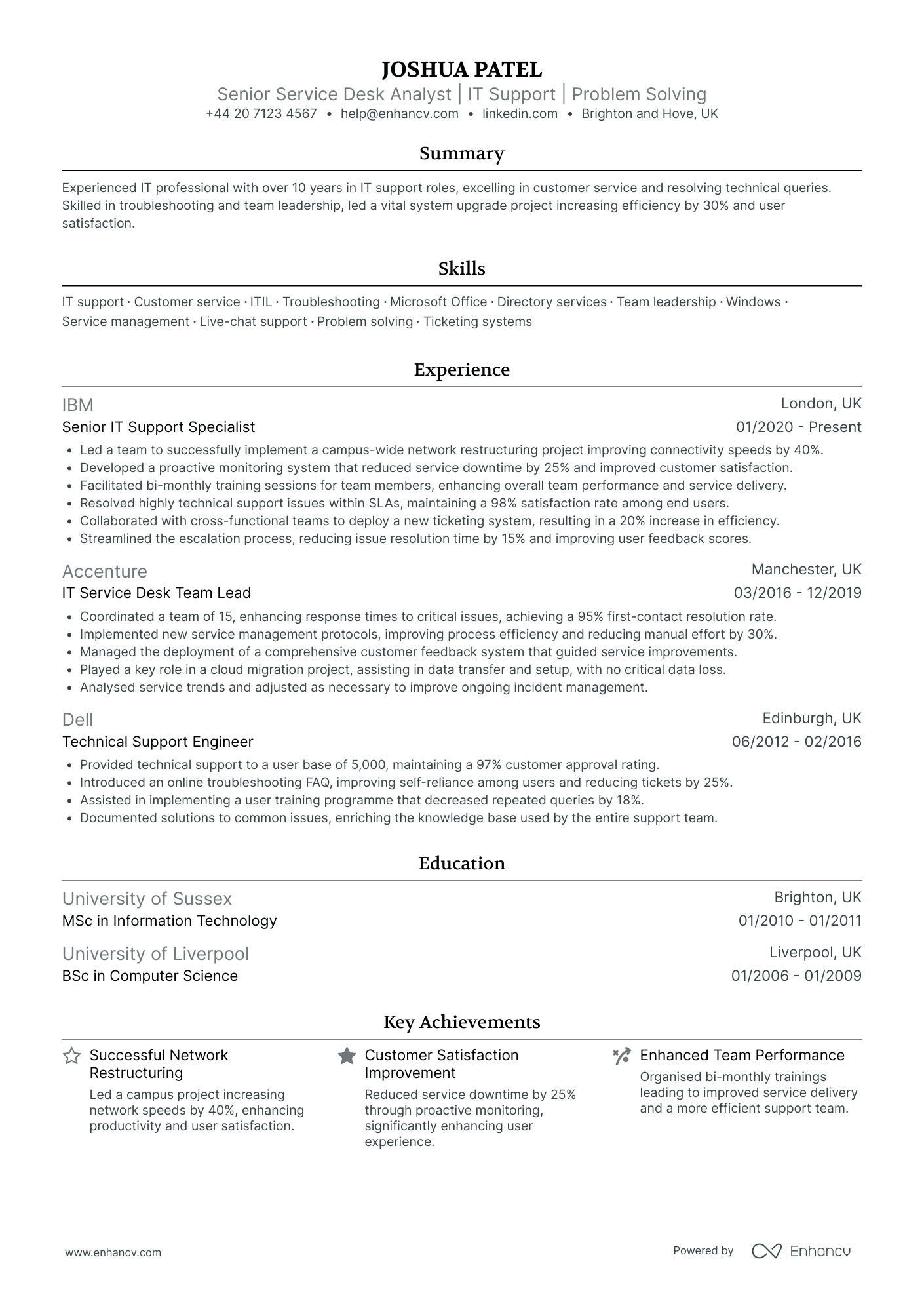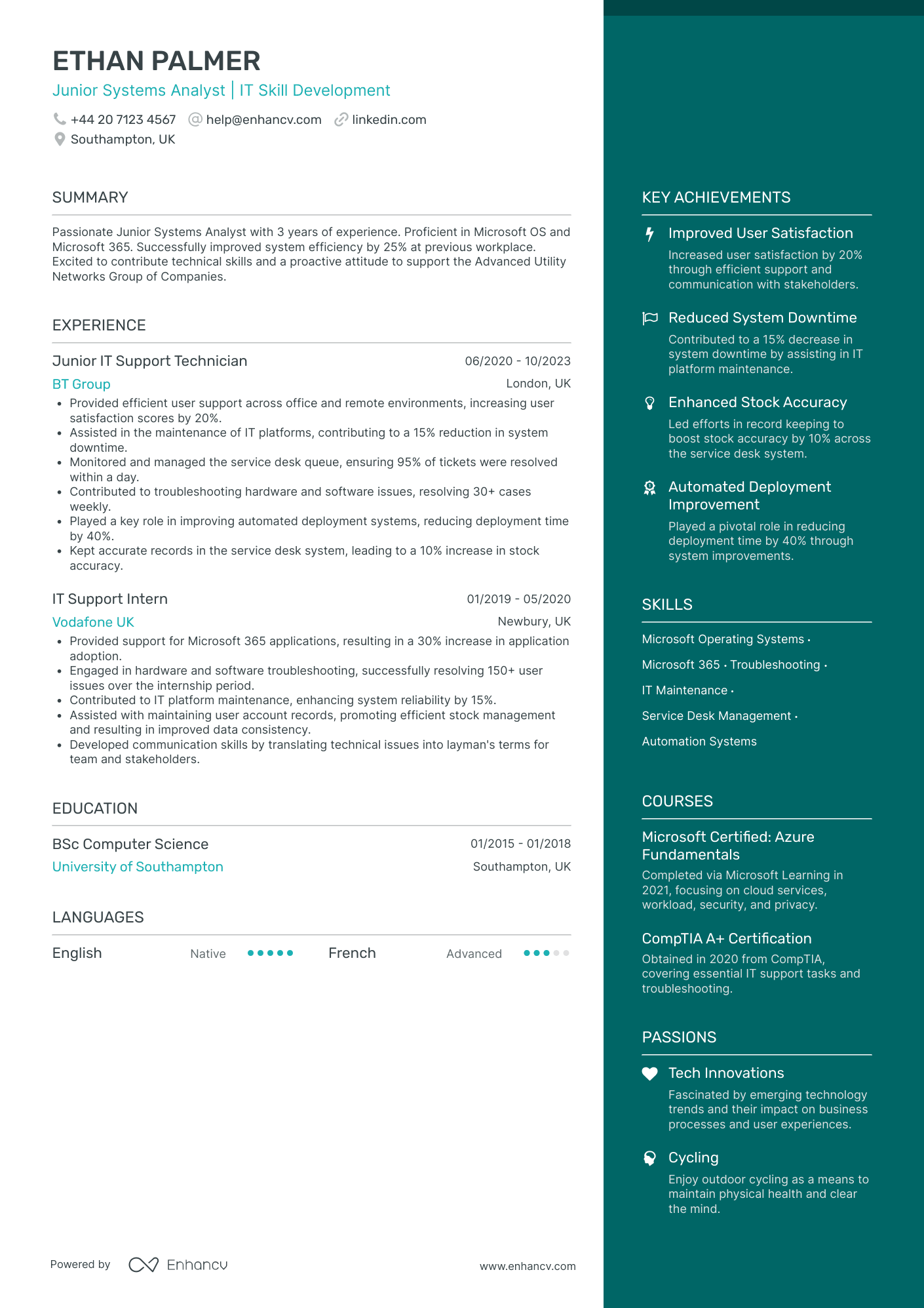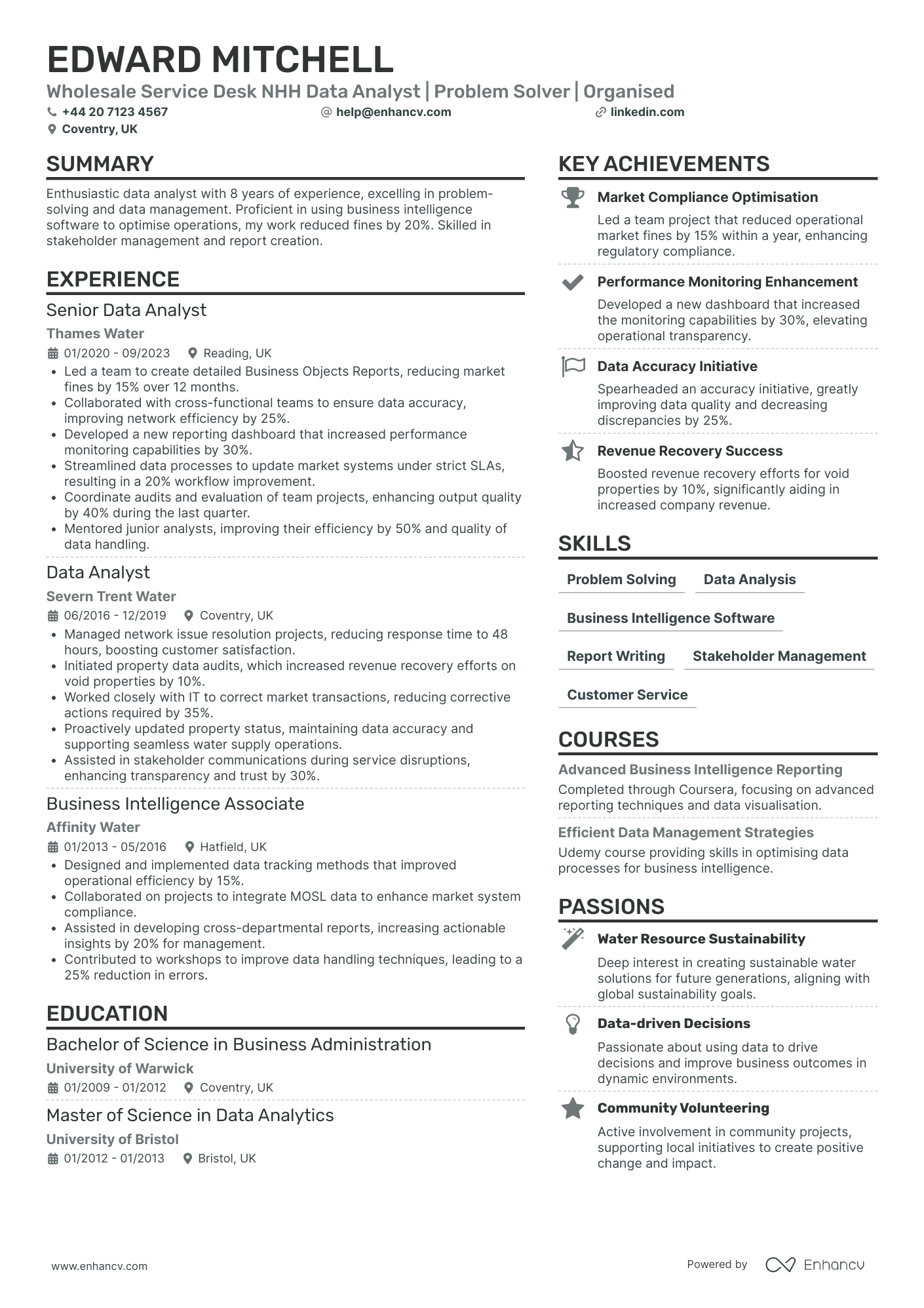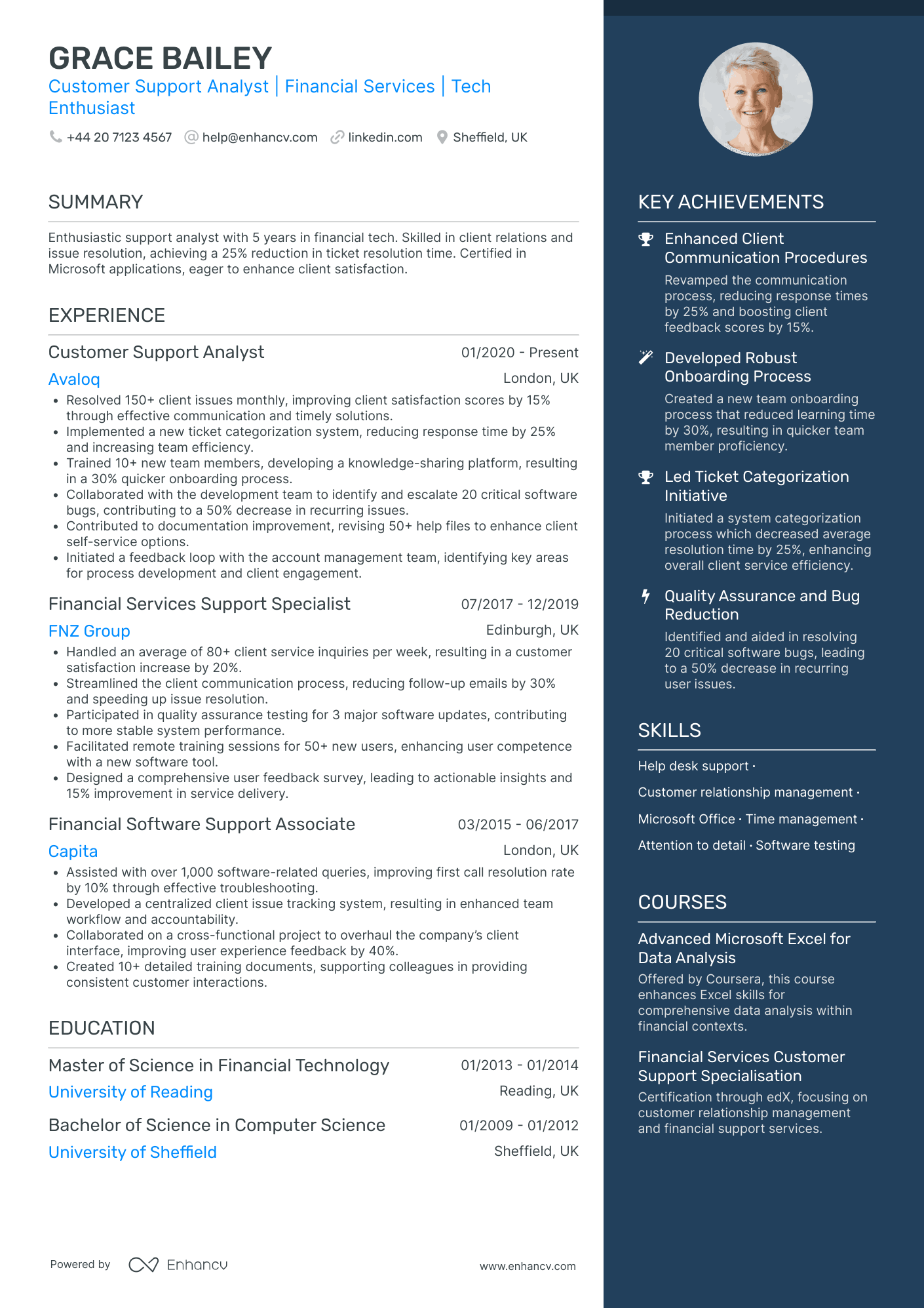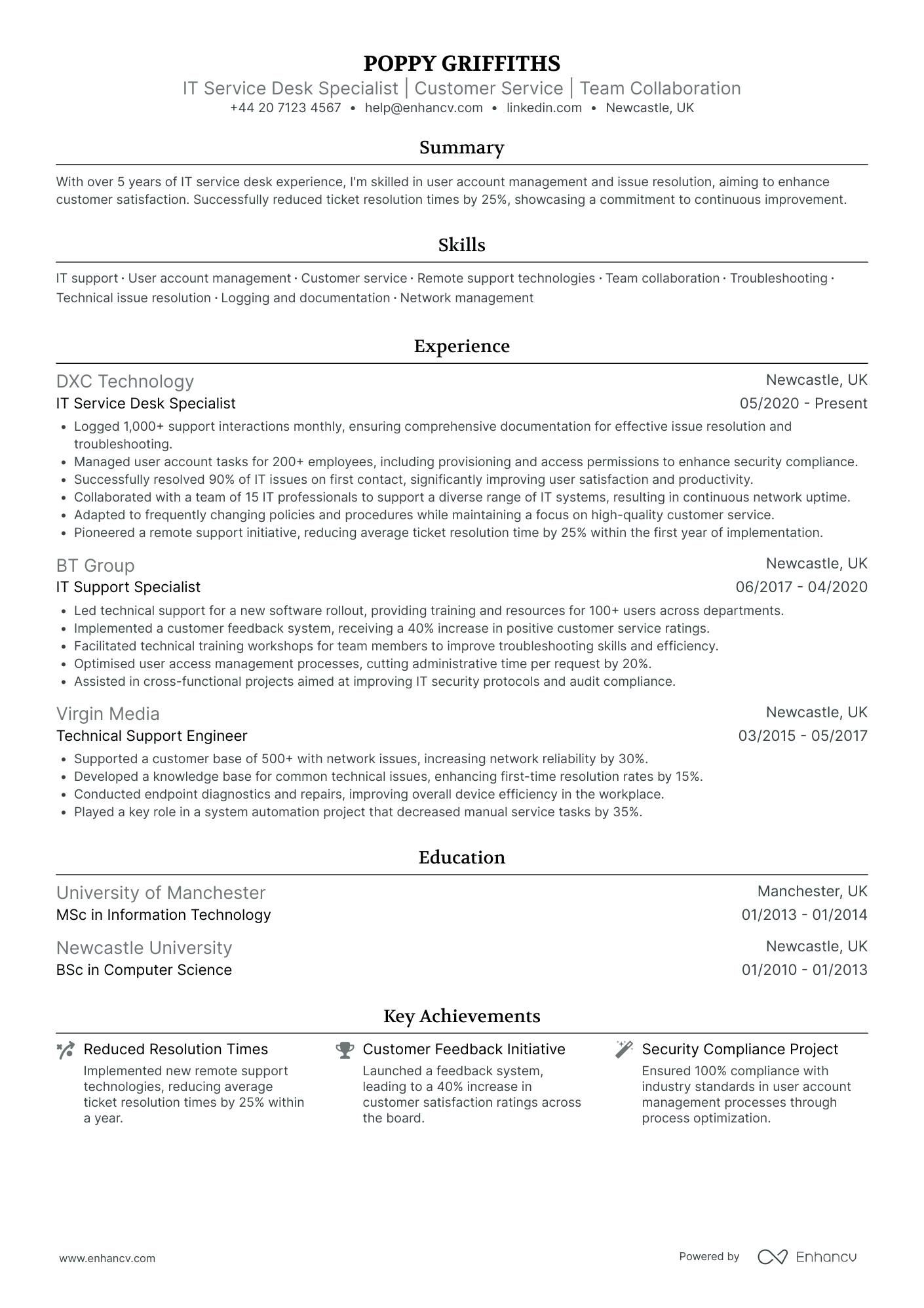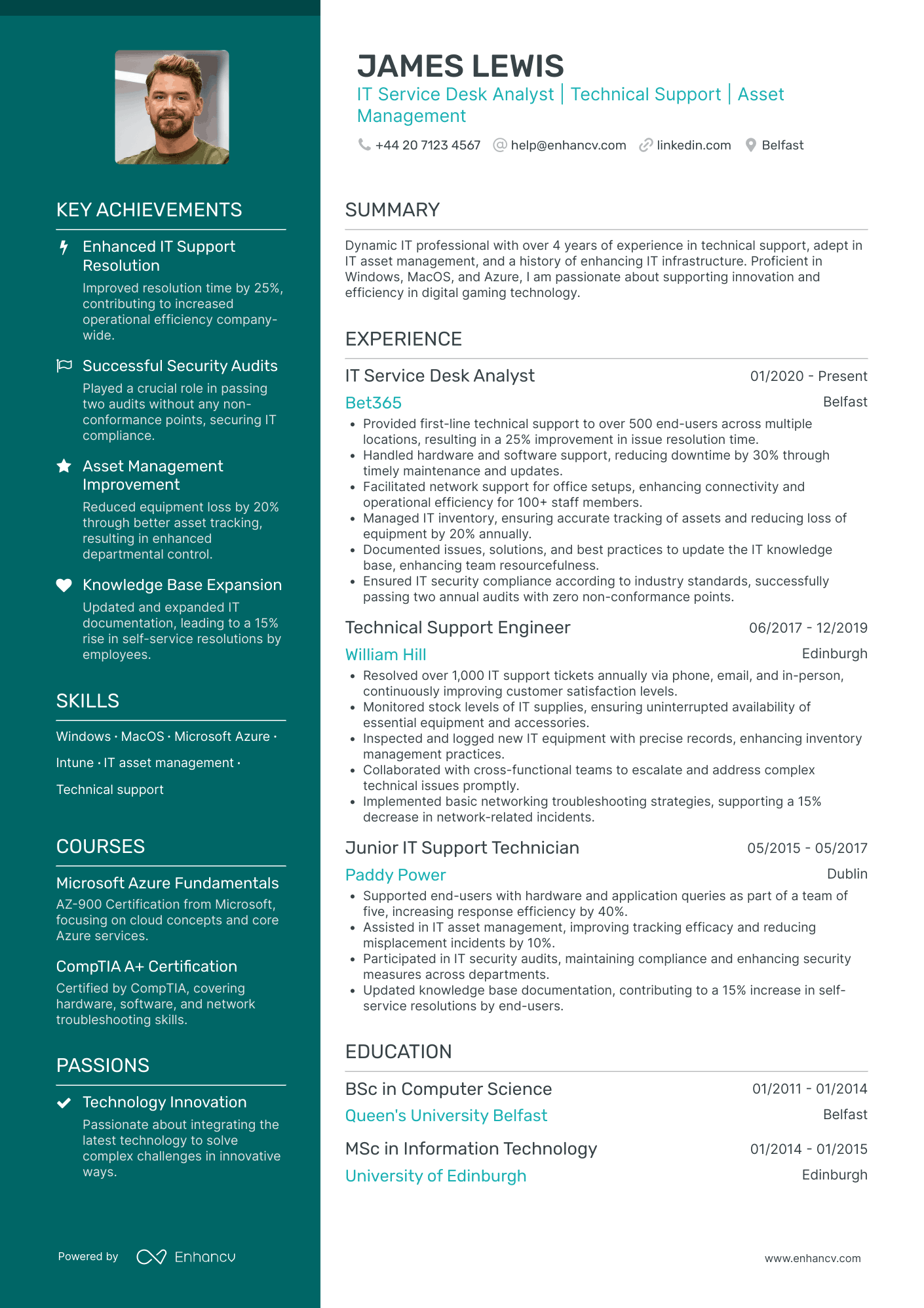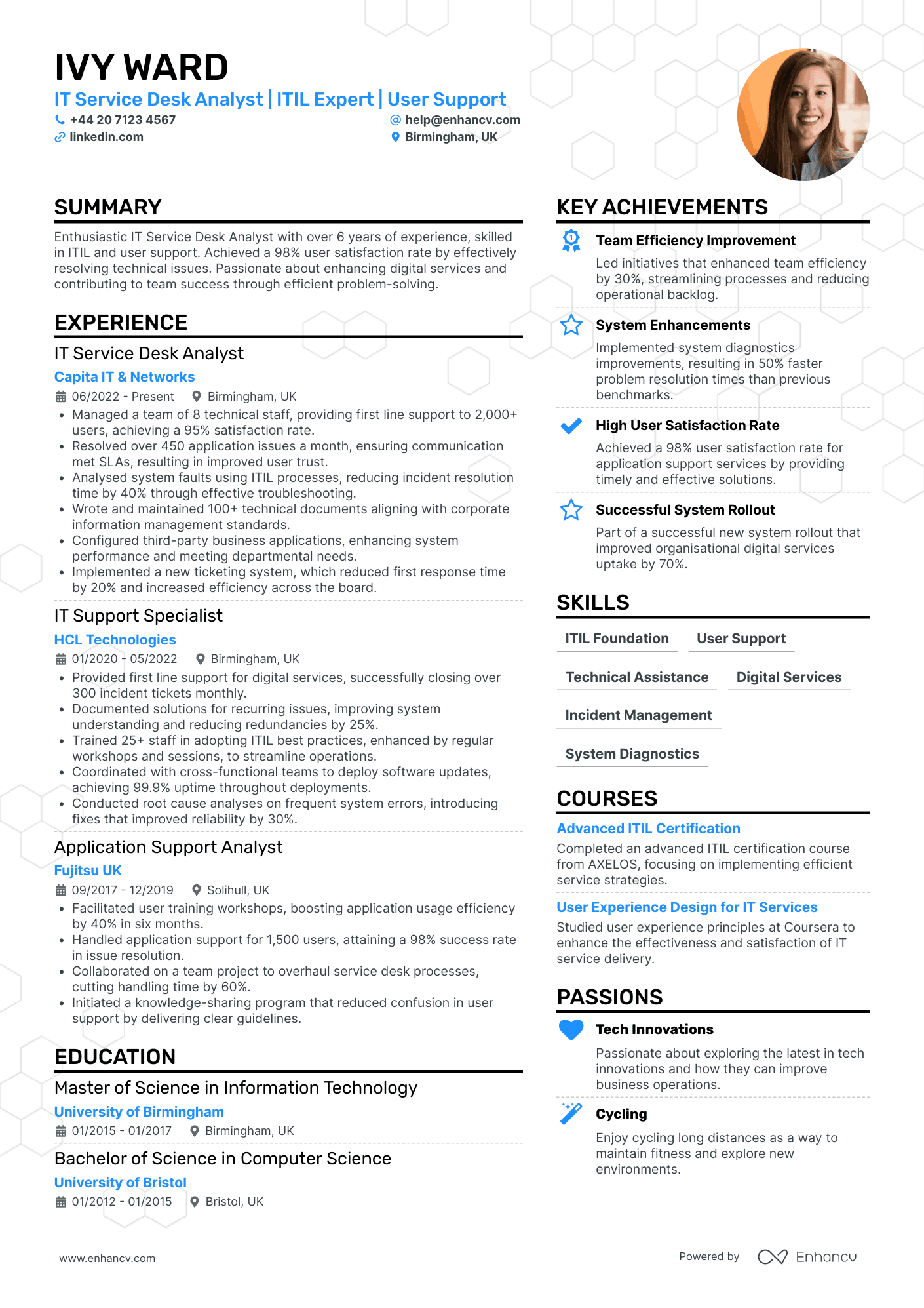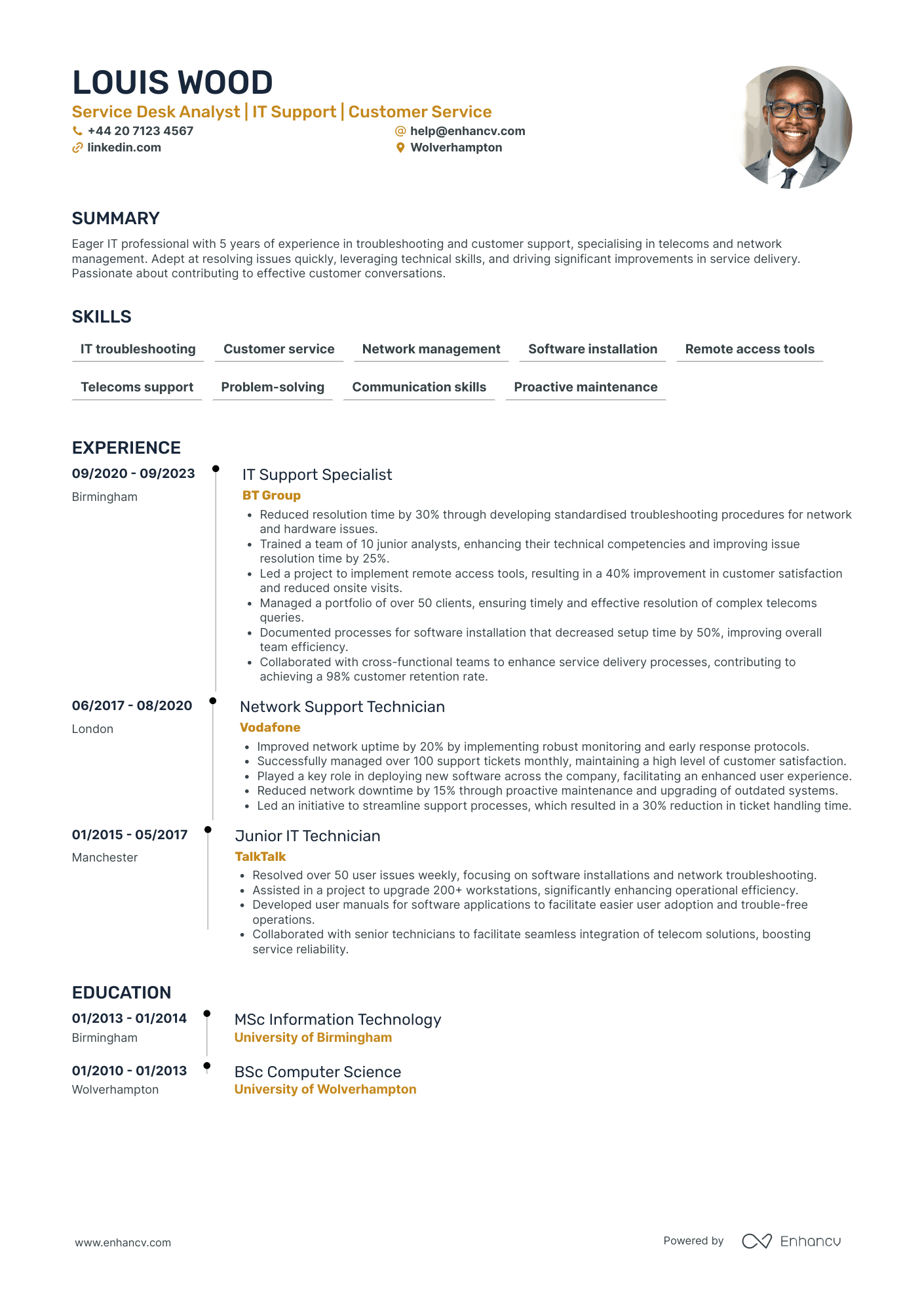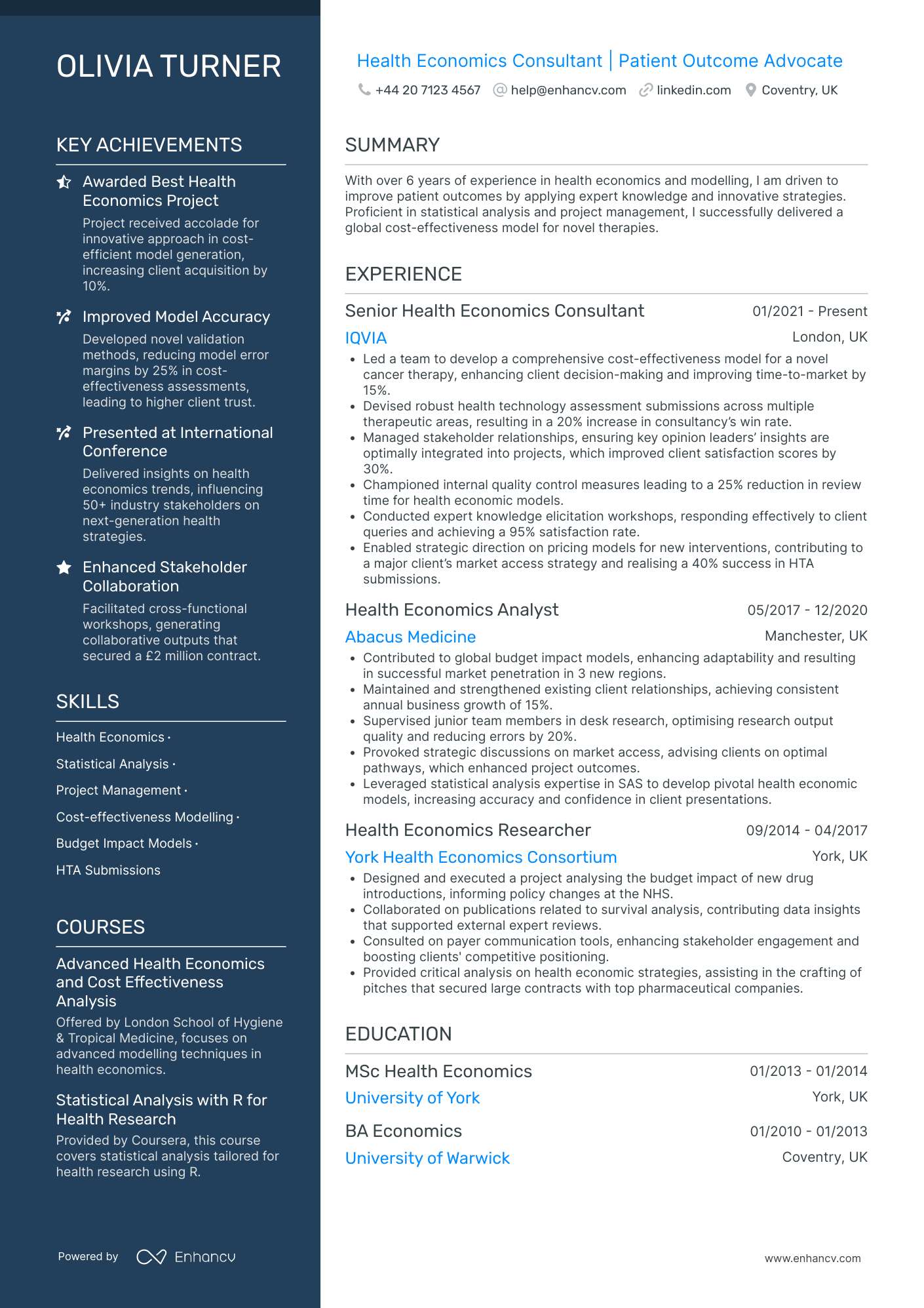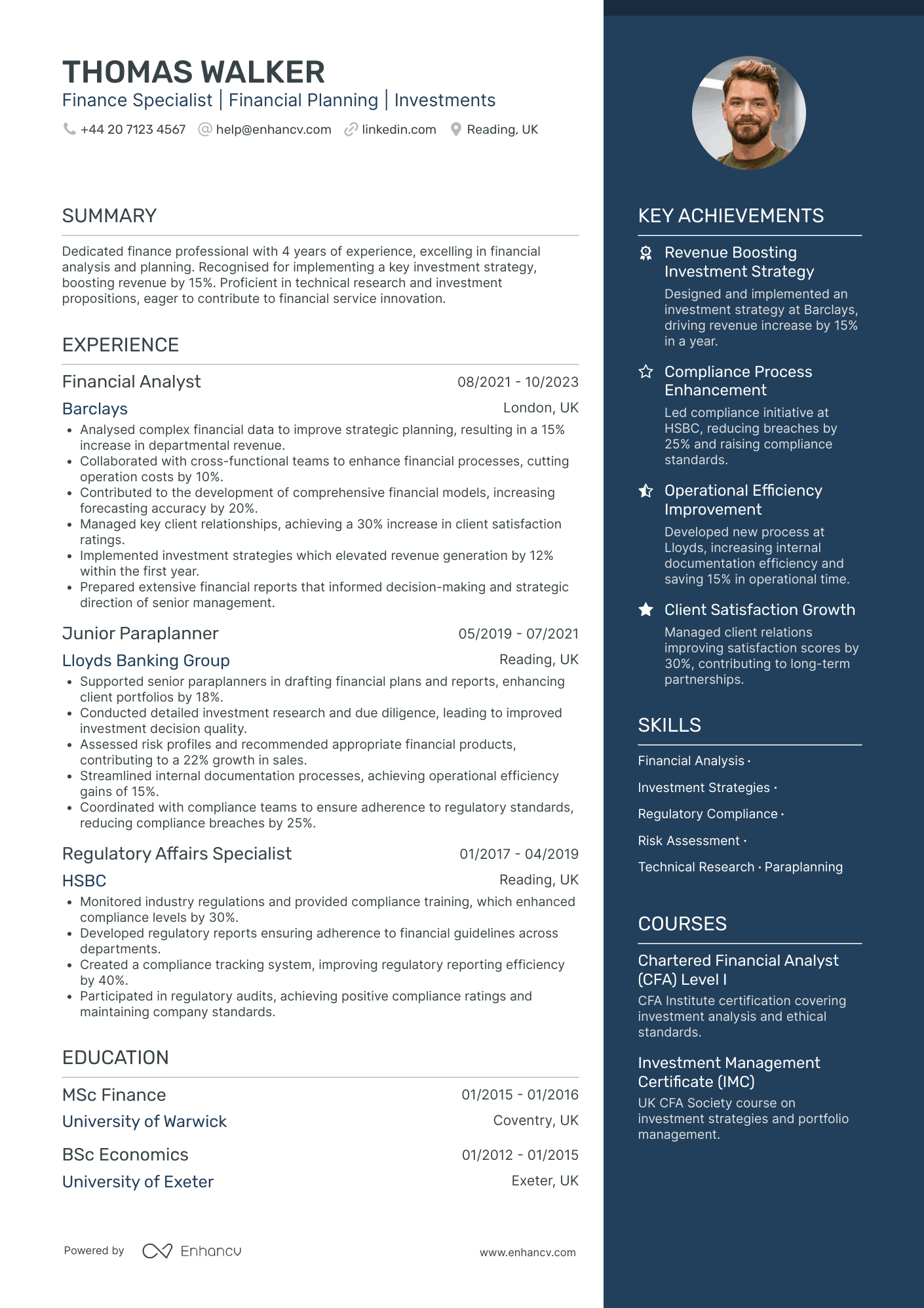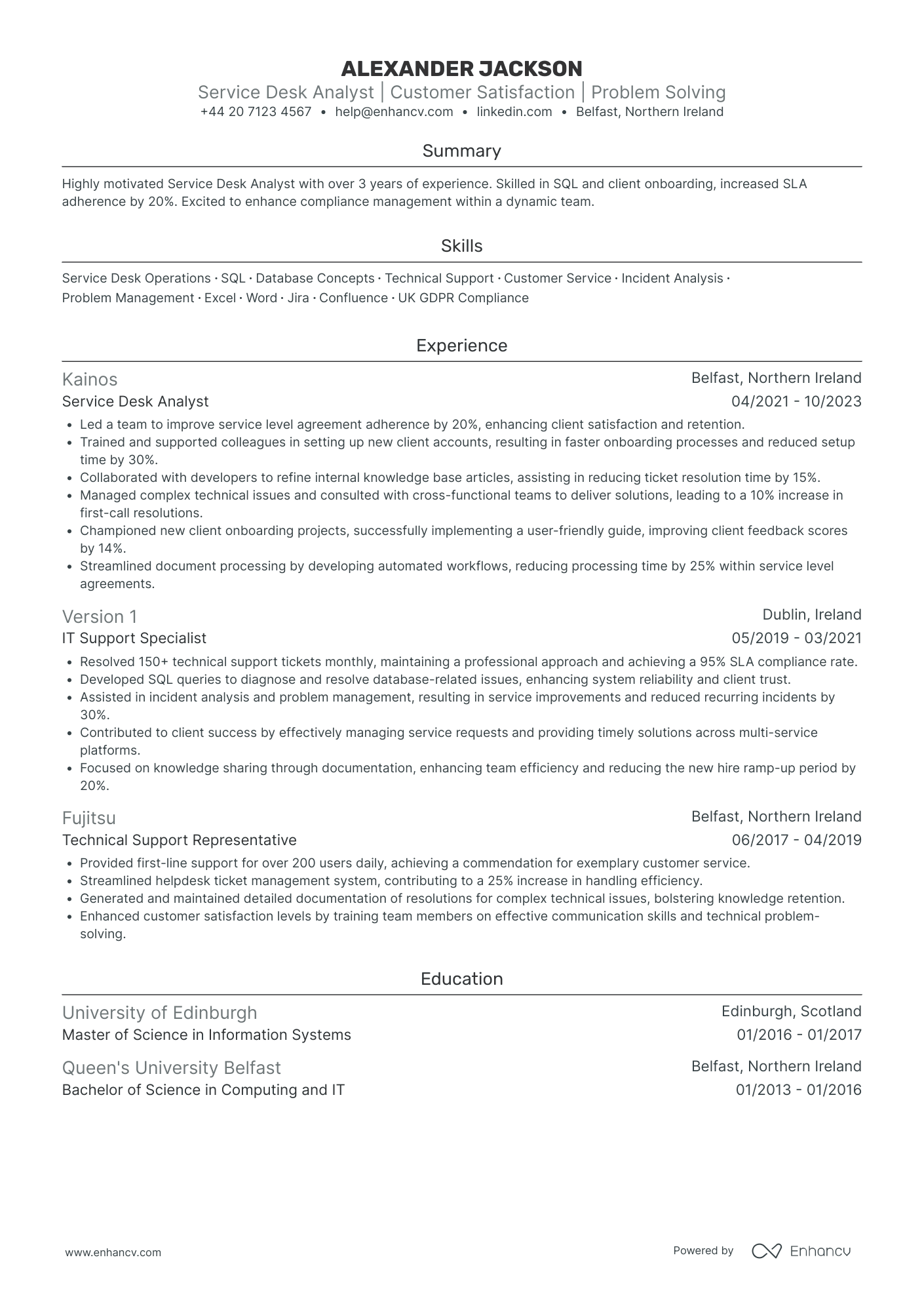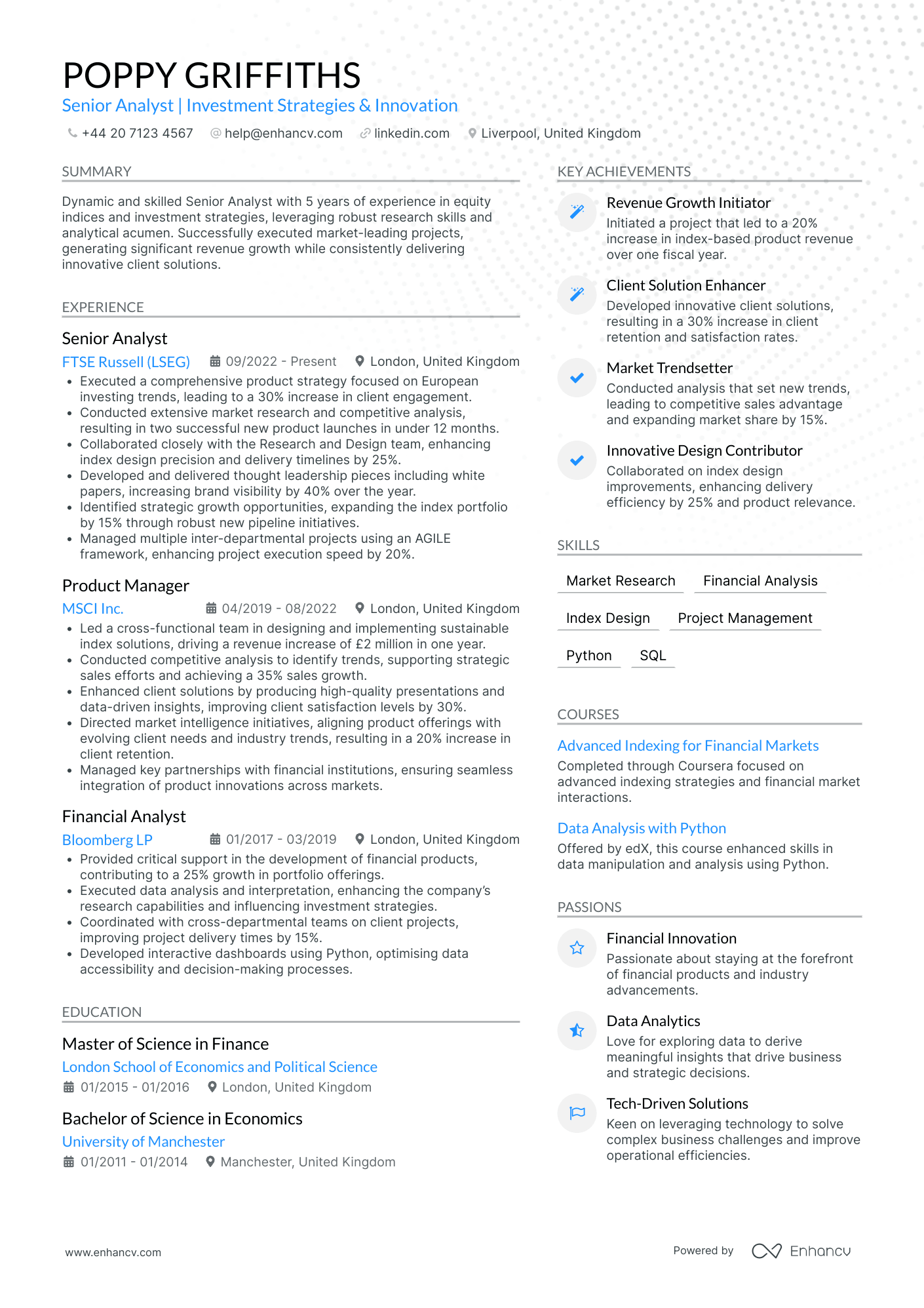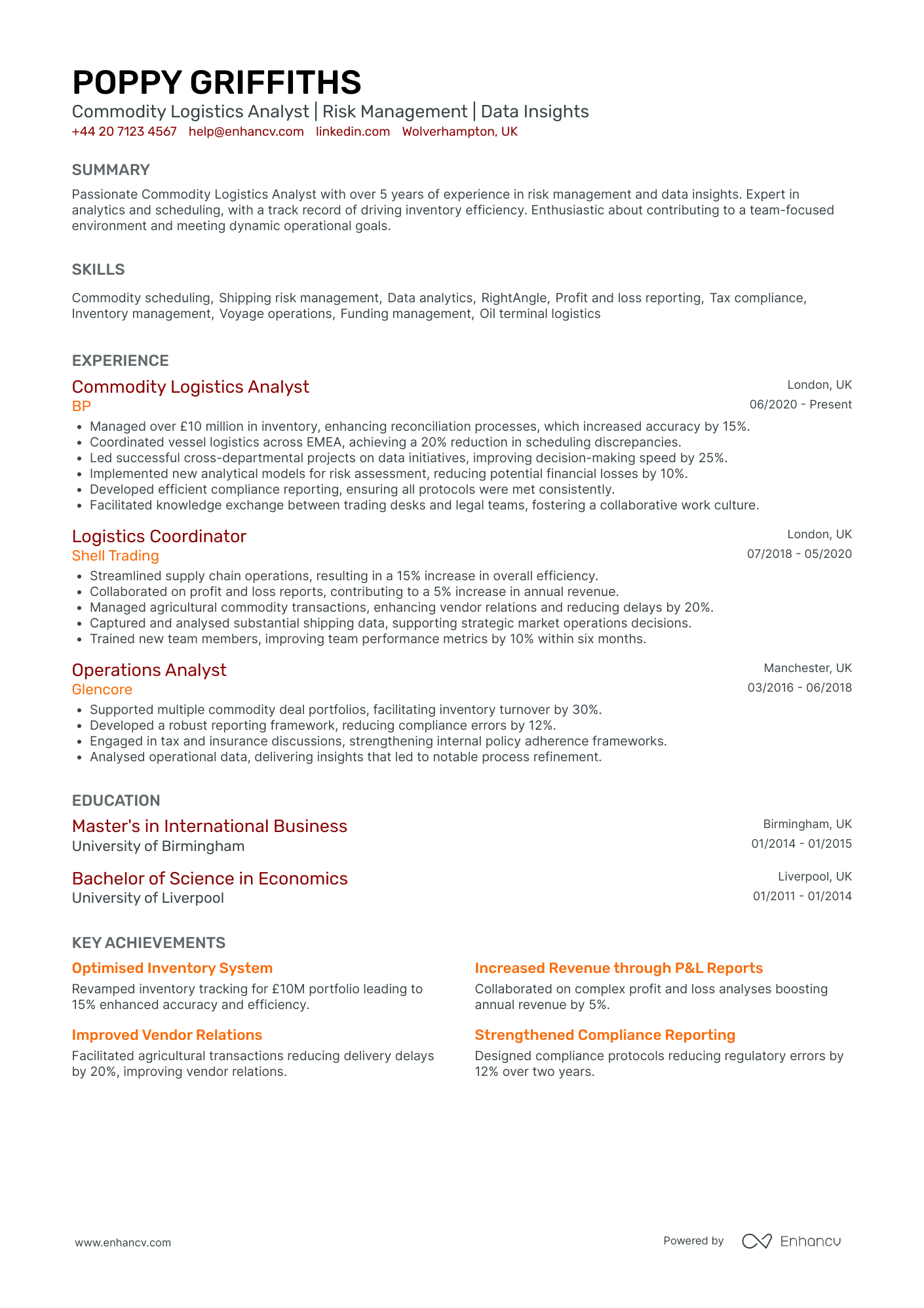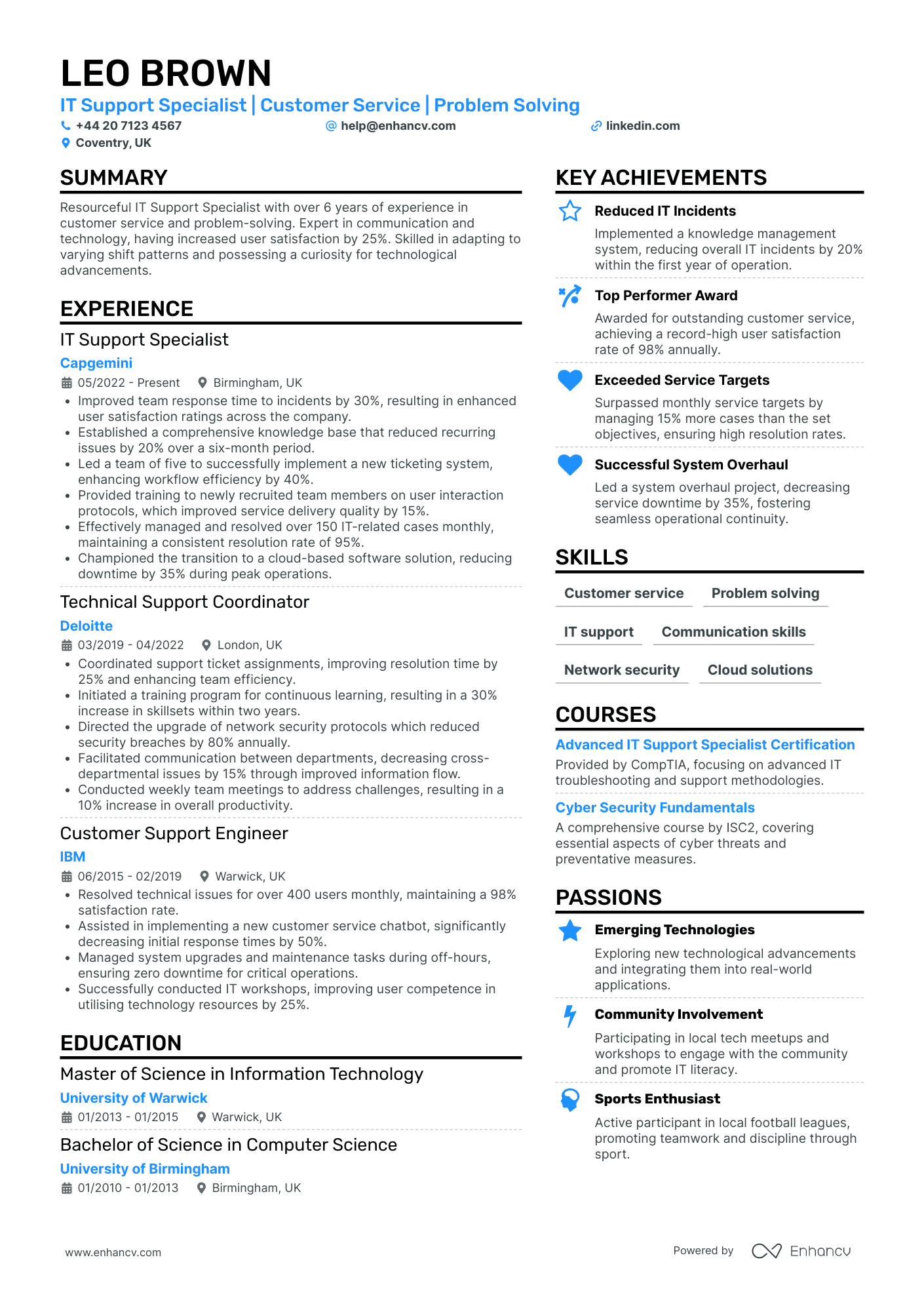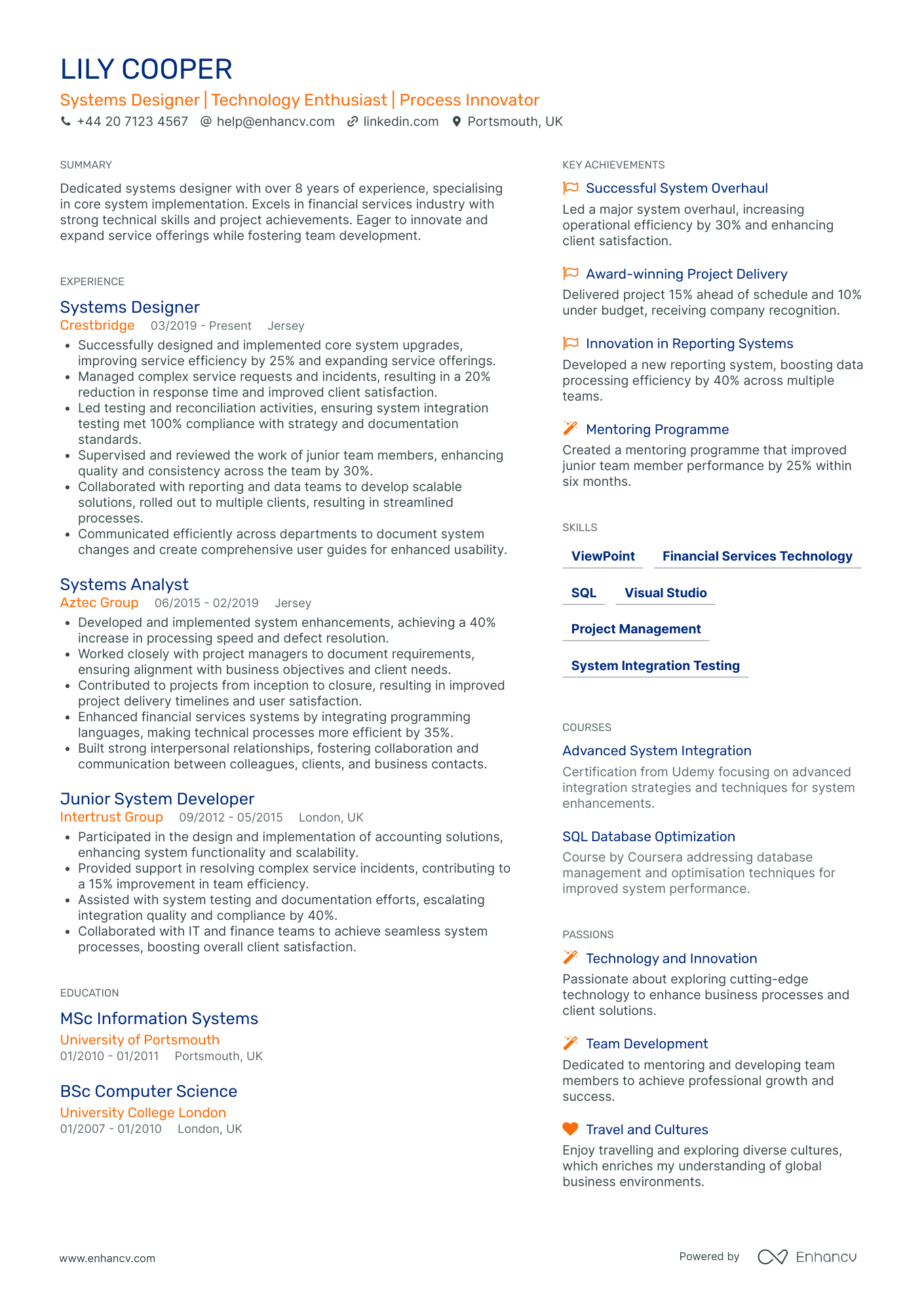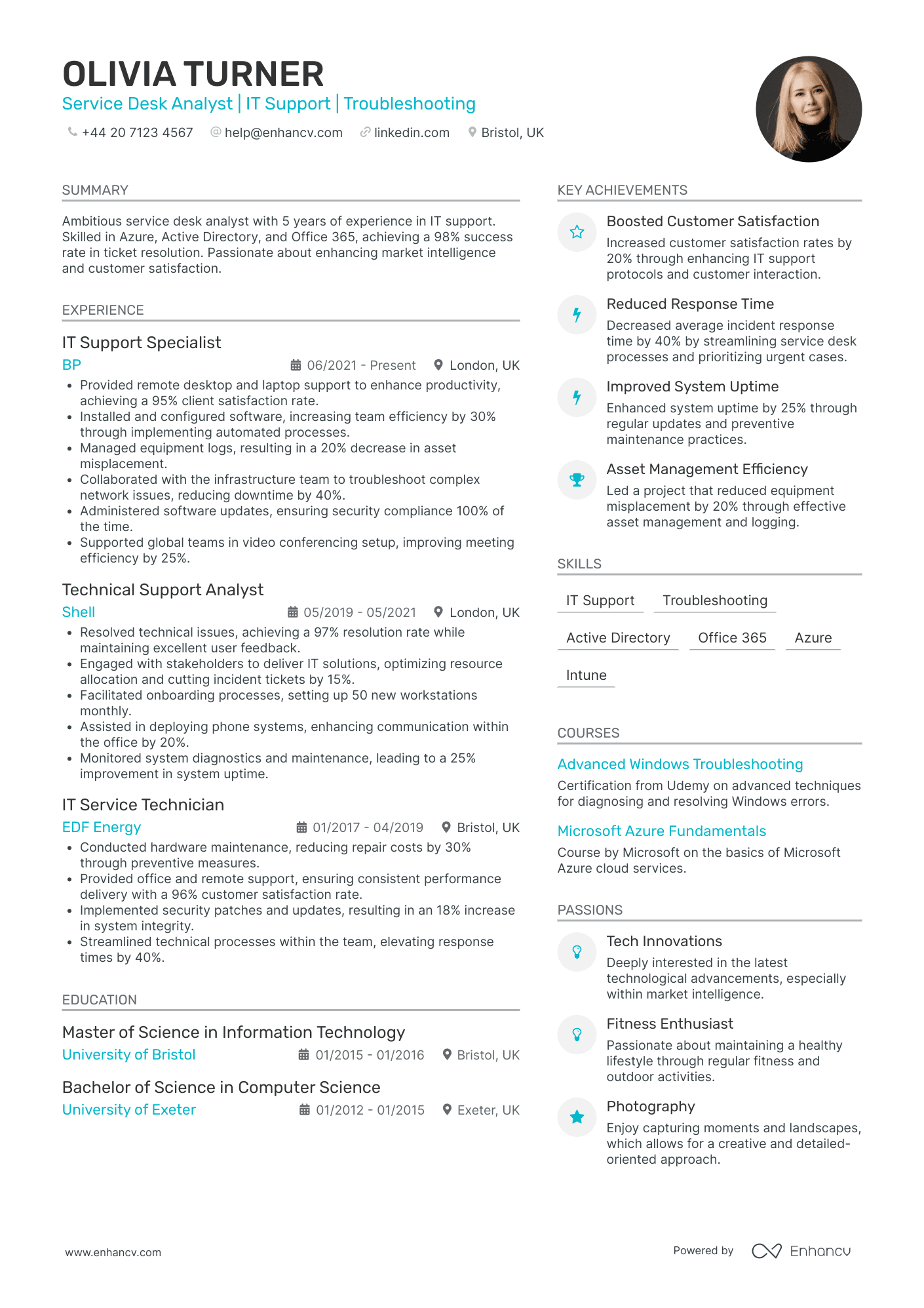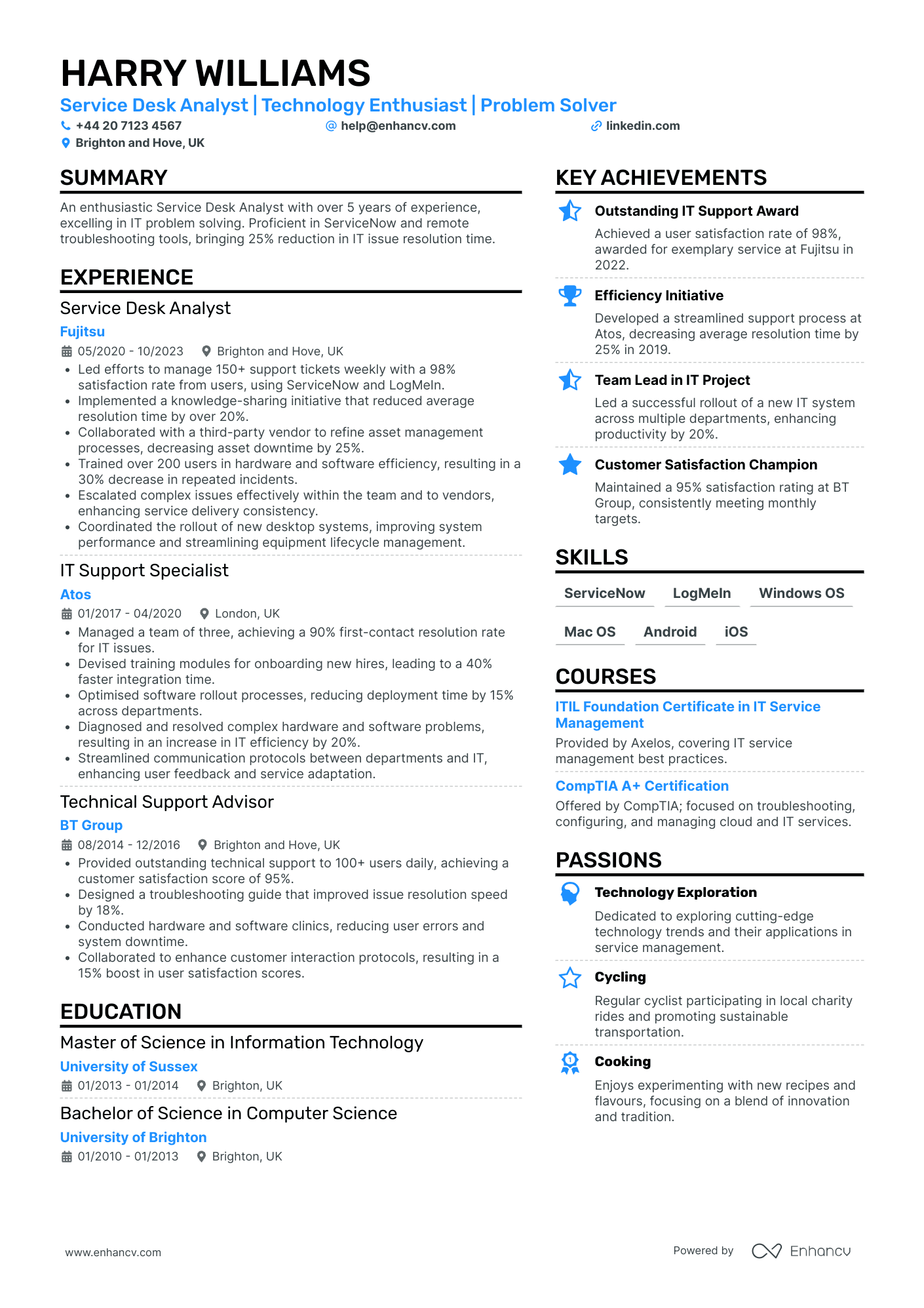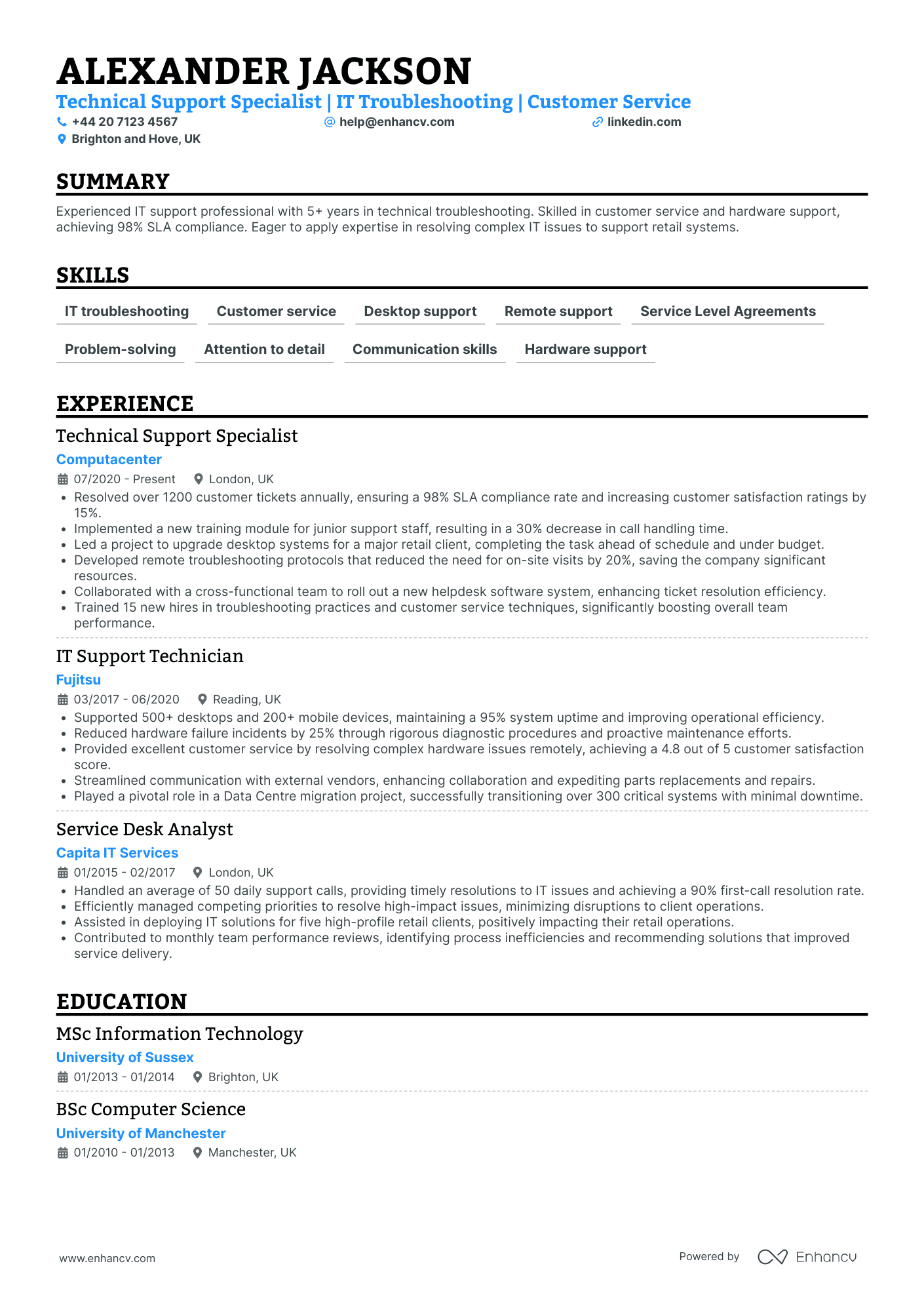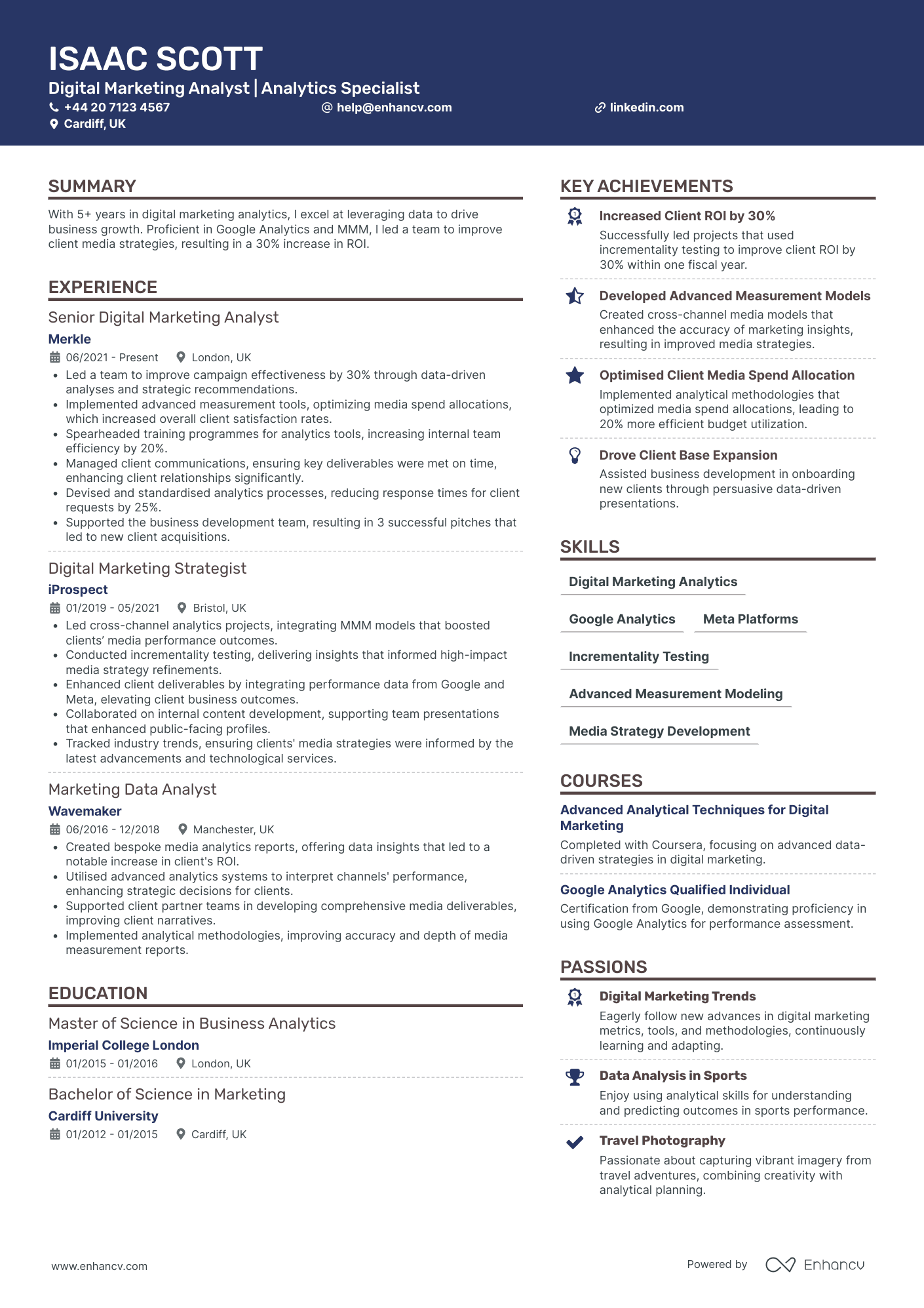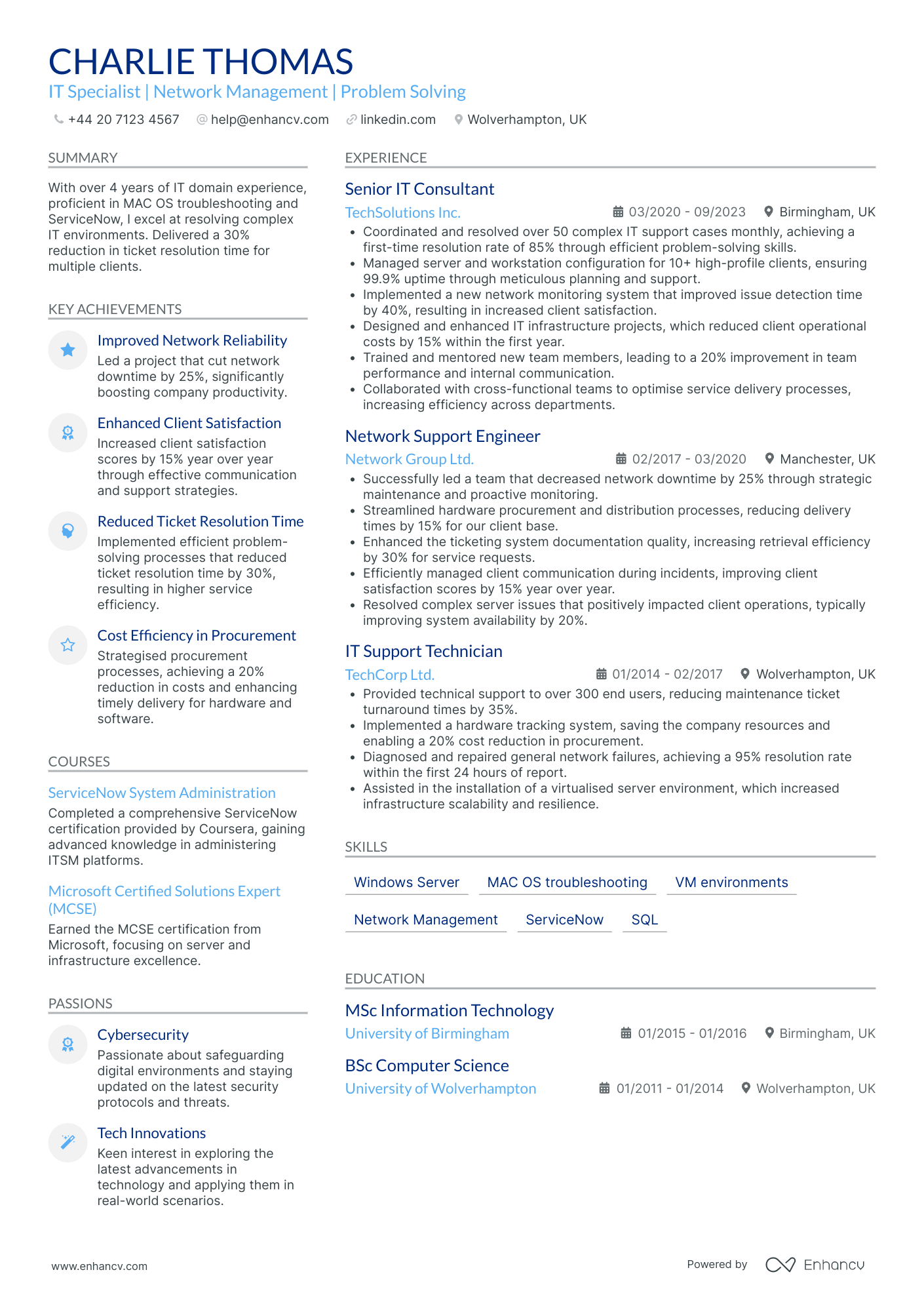Crafting a CV that effectively showcases your problem-solving skills and technical expertise can be a significant challenge for a service desk analyst. Delve into our guide, where you'll discover tailored advice to highlight your competencies and frame your experiences in a way that resonates with hiring managers.
- Answer job requirements with your service desk analyst CV and experience;
- Curate your academic background and certificates, following industry-leading CV examples;
- Select from +10 niche skills to match the ideal candidate profile
- Write a more succinct experience section that consists of all the right details.
Do you need more specific insights into writing your service desk analyst CV? Our guides focus on unique insights for each individual role:
Resume examples for service desk analyst
By Experience
Senior Service Desk Analyst
- Structured Presentation and Clarity - The CV is meticulously organized, with distinct sections such as experience, education, skills, and achievements that are easy to navigate. This structured approach enhances readability and ensures that each segment provides concise, relevant information, allowing recruiters to quickly assess the candidate’s qualifications and expertise.
- Career Growth and Leadership Development - Joshua’s career trajectory exhibits a clear progression from a Technical Support Engineer to a Senior IT Support Specialist, showcasing a blend of technical prowess and leadership capabilities. His promotions reflect growing responsibilities, like leading teams and managing significant projects, indicative of his competency and potential for further advancement.
- Effective Business Impact through Achievements - The CV effectively highlights achievements that not only state numerical improvements but also emphasize their business impact. For instance, leading a network restructuring project that improved connectivity by 40% directly translates to enhanced productivity and user satisfaction, demonstrating Joshua’s capacity to deliver significant organizational benefits.
Junior Service Desk Analyst
- Structured Career Growth - Ethan Palmer's CV clearly illustrates a consistent career trajectory with clear advancements from an IT Support Intern to a Junior IT Support Technician, demonstrating a solid foundation in IT support before transitioning to systems analysis. The roles at renowned organizations like Vodafone UK and BT Group show a strong pathway in the IT industry.
- Effective Use of Metrics - The CV notably uses specific metrics to highlight competence and impact, such as a 25% improvement in system efficiency, 95% ticket resolution rate within a day, and a 15% reduction in system downtime. These achievements highlight Ethan's capability to drive performance improvements and operational efficiency, aligning with the goals of system analysis positions.
- Diverse Skill Set with Technical Proficiency - Ethan brings a robust mix of technical skills and certifications, such as expertise in Microsoft Operating Systems and Microsoft 365, alongside courses like Microsoft Certified: Azure Fundamentals and CompTIA A+ Certification. This combination of skills and formal training ensures a well-rounded profile equipped for technical challenges in systems analysis.
Lead Service Desk Analyst
- Content presentation ensures clarity and engagement - The CV is well-organized with clearly defined sections, enabling easy navigation through the candidate’s history and skills. This clarity not only reflects the candidate's organizational skills but also their ability to present information succinctly, making it accessible to potential employers.
- Diverse career trajectory reflects adaptability - Edward Mitchell's career path showcases significant growth and adaptability, moving from a Business Intelligence Associate to a Senior Data Analyst role. This progression within different companies in the utilities sector demonstrates his ability to advance and tackle new challenges, enhancing his value to future employers.
- Achievements underscore business impact and relevance - The CV doesn't just list responsibilities; it highlights specific achievements with measurable outcomes, like reducing market fines and increasing dashboard capabilities. These points emphasize Mitchell's impact on business operations and regulatory compliance, showcasing his ability to convert skills into concrete business improvements.
By Role
Customer Service Desk Analyst
- Concise and Structured Presentation - Grace Bailey’s CV is well-organized with clear section headings that facilitate easy navigation through her professional journey. Her experience is concisely presented with bullet points that highlight key achievements and responsibilities, allowing recruiters to quickly assess her suitability for the role.
- Career Growth and Industry Relevance - The career trajectory outlined in the CV reflects a steady progression within the financial services and technology industries. Grace has advanced from a Financial Software Support Associate to a Customer Support Analyst, demonstrating growth in responsibility and expertise, which is crucial in such a rapidly evolving sector.
- Impactful Achievements with Business Significance - The CV effectively communicates Grace’s business impact through specific achievements, such as reducing ticket resolution time by 25% and improving client satisfaction scores. These accomplishments indicate her ability to enhance operational efficiency and client relations, which are valuable skills for a Customer Support Analyst.
Technical Service Desk Analyst
- Clear Structuring and Conciseness - The CV is meticulously organized, with distinct sections dedicated to each key aspect of the candidate's professional profile, such as experience, education, and achievements. The use of bullet points enhances readability, allowing for quick identification of crucial information like achievements and responsibilities. Each entry is succinct yet detailed enough to convey the depth of the individual's expertise.
- Diverse Experience Across Notable Companies - Poppy Griffiths' career trajectory is noteworthy for its progression through reputable companies such as DXC Technology, BT Group, and Virgin Media. This path demonstrates a clear pattern of growth in IT support, moving from starting positions to more specialized roles. Such a trajectory indicates a strong capability to adapt and excel in different work environments within the IT sector.
- Achievements with Significant Business Impact - The CV highlights achievements with direct business relevance. For instance, contributions like reducing ticket resolution times by 25% and implementing a feedback system resulting in a 40% increase in customer satisfaction are not just quantitative metrics, but indicators of the candidate’s effectiveness in driving improvements in service delivery and user experience.
Network Service Desk Analyst
- Engages with clear structure and concise content - The CV effectively uses clean organization and concise language, making it easy for recruiters to navigate quickly. Each section is distinct and logically ordered, focusing on relevant experiences, skills, and qualifications that align with the job title of IT Service Desk Analyst.
- Showcases a progressive career journey - James Lewis's career trajectory reflects a steady progression in responsibilities and expertise. Starting as a Junior IT Support Technician and climbing to an IT Service Desk Analyst demonstrates his growth and increasing impact within the technical support domain.
- Highlights proficiency in industry-specific tools and methodologies - The CV details James's expertise in essential technological tools such as Windows, MacOS, and Microsoft Azure. This technical depth, along with certifications like CompTIA A+ and Microsoft Azure Fundamentals, illustrates a strong foundation in IT support crucial for the industry.
By Industry
Service Desk Analyst in IT
- Concise and Structured Presentation - The CV is well-organized with clear sections, making it easy to navigate. Each section, from experience to education, is neatly demarcated and described concisely, allowing reviewers to quickly grasp key points without unnecessary detail.
- Progressive Career Trajectory - Ivy Ward's career demonstrates a clear upward trajectory, marked by increasing responsibilities such as managing a team and implementing systems improvements. Her promotions from an IT Support Specialist to an IT Service Desk Analyst illustrate her growing expertise and leadership skills in the field.
- Emphasis on Industry-Specific Methodologies - The CV highlights Ivy's depth in ITIL processes, which are crucial in the IT service sector. Furthermore, her achievements in implementing ticketing systems and conducting root cause analyses reflect her technical proficiency and industry-specific knowledge.
Service Desk Analyst in Telecommunications
- Structured Career Progression - Louis Wood's CV illustrates a clear career trajectory in the IT sector, moving from a Junior IT Technician to an IT Support Specialist. Each role builds upon the last, showcasing growth in responsibility and expertise, particularly in network management at high-profile telecoms companies, which adds depth to his professional narrative.
- Emphasis on Measurable Achievements - The CV highlights impactful achievements with concrete data, such as reducing resolution time by 30% and improving customer satisfaction by 40%. These metrics demonstrate Louis's ability to drive business improvements and contribute positively to both customer service and operational efficiency.
- Strong Technical and Soft Skills Fusion - Alongside technical expertise in IT troubleshooting and network management, the CV also underscores essential soft skills like training and cross-team collaboration. Louis has enhanced his teams' capabilities significantly, paying attention to leadership and communication, which are critical in service desk roles.
Service Desk Analyst in Healthcare
- Comprehensive career evolution and upward mobility - Olivia's career trajectory is marked by clear progression in roles and responsibilities, from Health Economics Researcher to Senior Health Economics Consultant. Her advancement within the health economics consultancy field showcases her increasing expertise and leadership capabilities, reflecting positively on her ability to take on more complex challenges.
- Depth of technical expertise and tool proficiency - The CV highlights Olivia's extensive technical knowledge and proficiency in industry-specific tools such as SAS, STATA, and R. Her capability to develop cost-effectiveness models and budget impact models demonstrates a sophisticated understanding of health economics, essential for translating data insights into actionable strategies.
- Strategic impact through significant achievements - Olivia's achievements underscore her strategic contributions to her employers and clients. For instance, the 25% reduction in review time for health economic models indicates an operational efficiency that boosts her team's productivity, while the 40% success in HTA submissions emphasizes her ability to craft impactful market access strategies, ultimately enhancing organizational success.
Service Desk Analyst in Financial Services
- Clear and Organized Structure - The CV is well-organized with distinct sections for summary, experience, education, skills, courses, achievements, languages, and passions, making it easy for readers to quickly locate and evaluate specific information. This clarity and conciseness ensure that the candidate’s qualifications are immediately apparent, facilitating a smoother decision-making process for recruiters.
- Diverse Career Trajectory - Thomas Walker’s career path displays significant growth and progression, starting from a Regulatory Affairs Specialist at HSBC to a Financial Analyst at Barclays. This trajectory not only demonstrates adaptability to varying roles within the financial sector but also a consistent upward movement towards more complex and impactful positions, reflecting the candidate's commitment to professional development and leadership potential.
- Achievements with Tangible Business Impact - The CV includes notable achievements that are directly tied to business outcomes, such as implementing an investment strategy that increased revenue by 15% and enhancing client satisfaction by 30%. These accomplishments highlight Thomas's ability to drive significant, quantifiable benefits within an organization, showcasing their strategic value and effectiveness in a financial role.
IT Service Desk Analyst in Education
- Structured and Clear Presentation - The CV is well-organized with distinct sections for experience, education, skills, and achievements. It presents information concisely, making it easy for potential employers to quickly grasp the applicant's qualifications and professional history.
- Demonstrated Career Growth and Adaptability - The individual's career trajectory shows clear growth from a Technical Support Representative to a Service Desk Analyst, reflecting their ability to adapt and assume greater responsibilities across different companies within the tech support industry.
- Industry-Relevant Skills and Certifications - The CV emphasizes technical skills relevant to service desk operations, including SQL, ITIL certification, and database management, which are crucial for a role in IT support and customer satisfaction. The inclusion of courses further underscores the candidate’s commitment to ongoing professional development.
Service Desk Analyst in Retail
- Concisely Structured and Clear Presentation - The CV is organized to highlight essential sections like experience, education, and skills in a coherent manner. Each role includes succinct bullet points that emphasize key achievements and responsibilities, allowing readers to quickly grasp the candidate's proficiency and past contributions.
- Demonstrates a Strong Career Growth Trajectory - The candidate’s career path from a Financial Analyst at Bloomberg LP to a Senior Analyst at FTSE Russell (LSEG) displays significant professional progression. The CV outlines increased responsibilities and leadership roles, illustrating the candidate's upward mobility and capability to adapt to more complex challenges.
- Emphasis on Industry-Specific Expertise and Tools - The document showcases proficiency in tools and methodologies such as AGILE framework, Python, and SQL, demonstrating technical depth essential for investment strategy roles. This highlights the candidate's capability to utilize industry-specific tools for effective decision-making and strategic planning.
Service Desk Analyst in Logistics
- Structured and Cohesive Presentation - The CV is neatly organized into clear sections that highlight important details such as experience, education, and skills. Each section is concise, making it easy for employers to quickly assess Poppy Griffiths' qualifications and expertise. Emphasizing specific dates, locations, and bullet points enhances readability and ensures clarity in Poppy's professional journey.
- Progressive Career Development - Poppy Griffiths demonstrates a well-defined career trajectory, with positions that reflect upward movement and increasing responsibility within the logistics and commodities field. From starting as an Operations Analyst to advancing to a Commodity Logistics Analyst, her career shows strategic growth, particularly with major industry players like BP, Shell Trading, and Glencore.
- Proficiency in Industry-Specific Tools and Techniques - The inclusion of specialized tools such as RightAngle, alongside methodologies like risk management and data analytics, underscores Poppy's technical depth in commodity logistics. These elements highlight her ability to apply specific analytical models and inventory management strategies, showcasing her technical expertise in creating significant impacts within the sector.
Service Desk Analyst in Manufacturing
- Structured Content Presentation - The CV is meticulously organized, presenting information in a clear, concise manner. Each section is logically ordered, allowing easy navigation through the candidate's qualifications. The use of bullet points enhances readability, making it simple to identify key achievements and responsibilities.
- Impressive Career Growth - The career trajectory of the candidate demonstrates significant professional advancement, moving from a Customer Support Engineer at IBM to an IT Support Specialist at Capgemini within a relatively short time frame. This progression showcases their commitment to growth and the accumulation of relevant experience across different organizations.
- Cross-Functional Leadership - Soft skills such as leadership and adaptability stand out, evident from roles where the candidate led teams, managed cross-department communication, and provided exceptional customer service. Their ability to improve team efficiency and satisfaction metrics emphasizes strong interpersonal and leadership capabilities.
Service Desk Analyst in Insurance
- Clear and Structured Presentation - The CV is meticulously organized, making it easy to follow the candidate's professional journey. Each section is well-defined, allowing potential employers to quickly identify key areas of expertise and achievements.
- Cohesive Career Progression - Lily Cooper’s career trajectory showcases a steady climb up the professional ladder, beginning as a Junior System Developer and advancing to a significant role as a Systems Designer. This growth demonstrates her commitment and capability to handle more complex and impactful roles over time.
- Noteworthy Achievements with Tangible Impact - The CV not only provides quantifiable outcomes like improved service efficiency and reduced project timelines but also highlights their significance in enhancing client satisfaction and operational success, thus stressing the candidate's value to prospective employers.
Service Desk Analyst in Energy
- Structured and Clear Presentation - This CV is well-organized, with clear sections that group relevant information together. The use of bullet points in the experience section allows for easy reading and a quick understanding of responsibilities and achievements. The concise language aids in maintaining focus and clarity, ensuring that the reader can quickly absorb the candidate's qualifications.
- Consistent Career Growth and Industry Expertise - Olivia Turner demonstrates steady career progression, moving from an IT Service Technician role to a Service Desk Analyst. This trajectory showcases her commitment to advancing within the IT support field, gaining experience in prestigious companies like BP and Shell, and increasingly handling more complex responsibilities, which underscores her growth and adaptability.
- Technical Depth and Specialty in IT Support - The CV highlights Olivia's proficiency with specific industry tools and methodologies such as Azure, Active Directory, and Office 365. The inclusion of specialized courses and certifications further adds to her technical credibility and demonstrates a dedication to staying updated with the latest technologies in IT support and troubleshooting.
Service Desk Analyst in Pharmaceutical
- Concise and well-organized layout - The CV follows a structured format, making it easy for recruiters to scan and identify key information quickly. Each section is clearly defined, allowing for easy navigation through the candidate’s professional journey, skills, and accomplishments.
- Consistent career progression in IT support - Harry Williams' career trajectory showcases a logical progression within the IT support industry, moving from Technical Support Advisor to IT Support Specialist, and eventually taking on a leadership role as a Service Desk Analyst. This demonstrates his growing expertise and increasing responsibility over time, which is appealing to potential employers.
- Robust technical proficiency with industry-relevant tools - The resume highlights the candidate’s technical expertise with a focus on critical tools such as ServiceNow and LogMeIn. Additionally, his ability to implement knowledge-sharing initiatives and manage complex troubleshooting situations underscores his deep technical acumen in a fast-paced IT environment.
Service Desk Analyst in Hospitality
- Efficient Content Structuring - The CV is meticulously structured, allowing key information to be easily accessible and digestible. Each section is clearly defined, with bullets that concisely summarize achievements and responsibilities. This clarity ensures that hiring managers can quickly ascertain the candidate's suitability for the role.
- Diverse Career Growth - Alexander Jackson's career trajectory demonstrates a sustained growth within the IT support industry, moving from a Service Desk Analyst to a Technical Support Specialist. This progression showcases an increasing level of responsibility and expertise, highlighting his ability to adapt and excel within different roles and organizations.
- Implementing Robust IT Solutions - The CV underscores Jackson's capability to implement industry-specific solutions, such as upgrading retail systems and developing remote troubleshooting protocols. These experiences highlight a deep technical acumen and an ability to enhance IT processes, directly benefiting business operations and customer satisfaction.
Service Desk Analyst in E-commerce
- Emphasis on leadership and teamwork - Isaac Scott's CV effectively illustrates his leadership capabilities by detailing his roles in spearheading training programs and managing client communications. This not only highlights his ability to lead teams but also his aptitude for fostering strong client relationships, which are critical in digital marketing.
- Focus on technical proficiency with industry-standard tools - The CV showcases Isaac's expertise with key digital marketing tools and methodologies, such as Google Analytics and MMM, which are essential for analyzing campaign performance and enhancing media strategies. This technical depth underscores his competency in utilizing advanced analytical techniques for driving business impact.
- Growth trajectory with significant industry impact - Over the years, Isaac has moved through different roles, from a Marketing Data Analyst to a Senior Digital Marketing Analyst, showcasing his career growth within reputable companies. His promotions indicate not just his personal development but also his increasing influence in shaping media strategies that optimize ROI and client satisfaction.
Service Desk Analyst in Public Sector
- Content presentation - The CV is structured in a way that promotes clarity and conciseness. Each section is clearly delineated, and the information is laid out in an easy-to-read format. The use of bullet points under each job role helps break down responsibilities and achievements, making it easier for a hiring manager to quickly grasp the candidate's capabilities and experiences.
- Career trajectory - The CV illustrates a clear upward trajectory in the candidate's career, moving from IT Support Technician to Network Support Engineer, and ultimately to Senior IT Consultant. This progression demonstrates not only deepening expertise within the IT sector but also a growing level of responsibility and influence within the organizations they have worked for.
- Achievements and their business relevance - Beyond listing numerical achievements, the CV effectively links these accomplishments to tangible business impacts. For instance, the candidate's initiatives to reduce network downtime and ticket resolution times are directly tied to improvements in company productivity and client satisfaction. This connection between personal contributions and organizational success highlights the candidate's value proposition.
Structuring your service desk analyst CV layout: four factors to keep in mind
There are plenty of best practices out there for your CV layout and design. At the end of the day, a clear format and concise CV message should be your top priority. Use your CV design to enhance separate sections, bringing them to the forefront of recruiters' attention. At the same time, you can write content that:
- Follows the reverse chronological order in the experience section by first listing your most recent jobs;
- Incorporates your contact information in the header, but do skip out on the CV photo for roles in the UK;
- Is spotlighted in the most important sections of your CV, e.g. the summary or objective, experience, education, etc. to show just how you meet the job requirements;
- Is no longer than two-pages. Often, the one-page format can be optimal for your service desk analyst CV.
Before submitting your CV, you may wonder whether to export it in Doc or PDF. With the PDF format, your information and layout stay intact. This is quite useful when your CV is assessed by the Applicant Tracker System (or the ATS) . The ATS is a software that scans your profile for all relevant information and can easily understand latest study on the ATS , which looks at your CV columns, design, and so much more.
PRO TIP
Use bold or italics sparingly to draw attention to key points, such as job titles, company names, or significant achievements. Overusing these formatting options can dilute their impact.
The top sections on a service desk analyst CV
Professional Summary to showcase service desk achievements: This provides a snapshot of the candidate's key accomplishments and sets the tone for the CV, highlighting their expertise and value they can bring to the service desk analyst role.
Technical Skills for effective problem-solving: Detailing proficiency in software, hardware, and systems relevant to service desk operations shows a candidate's capability to handle technical queries.
Work Experience with IT service desk roles: Listing past positions with specific responsibilities and achievements demonstrates the candidate's progression and expertise in service desk environments.
Education and Certifications for credibility: Displaying educational background and certifications, especially ITIL or other service desk-related qualifications, establishes the candidate's formal knowledge and commitment to professional development.
Customer Service Excellence in previous roles: This section illustrates the candidate's ability to provide high-quality support and their dedication to customer satisfaction, which is crucial for a service desk analyst.
What recruiters value on your CV:
- Highlight your technical expertise by detailing your familiarity with service desk software, such as ticketing systems or live chat platforms, and your proficiency in troubleshooting common IT issues.
- Emphasise your communication skills by showcasing examples of how you've successfully managed customer queries and resolved conflicts, reflecting your ability to maintain customer satisfaction.
- Demonstrate your ability to follow processes by mentioning certifications such as ITIL or experience with service level agreements, indicating your understanding of industry best practices.
- Include any relevant experience with customer service metrics, such as First Call Resolution or Average Handling Time, to show your commitment to efficiency and continuous service improvement.
- Outline examples of your problem-solving skills by sharing specific incidents where you've effectively identified, diagnosed, and resolved complex technical problems under pressure.
Recommended reads:
Tips and tricks on writing a job-winning service desk analyst CV header
The CV header is the space which most recruiters would be referring most often to, in the beginning and end of your application. That is as the CV header includes your contact details, but also a headline and a professional photo. When writing your CV header:
- Double-check your contact details for spelling errors or if you've missed any digits. Also, ensure you've provided your personal details, and not your current work email or telephone number;
- Include your location in the form of the city and country you live in. If you want to be more detailed, you can list your full address to show proximity to your potential work place;
- Don't include your CV photo, if you're applying for roles in the UK or US, as this may bias initial recruiters' assessments;
- Write a professional headline that either integrates the job title, some relevant industry keywords, or your most noteworthy achievement.
In the next part of our guide, we'll provide you with professional CVs that showcase some of the best practices when it comes to writing your headline.
Examples of good CV headlines for service desk analyst:
- Senior Service Desk Analyst | ITIL Certified | Problem Resolution Expert | 10+ Years in Technical Support
- IT Support Specialist | Microsoft Certified | Desktop & Network Troubleshooting | 5 Years' Experience
- Customer-Focused Service Desk Analyst | Incident Management Professional | CompTIA A+ | 3-Year Track Record
- Junior IT Helpdesk Analyst | Keen Interest in Cybersecurity | Emerging Technologies Enthusiast | Under 2 Years' Experience
- Experienced Technical Support Engineer | Project Management | Service Improvement Initiatives | 8 Years in IT Infrastructure
- Lead Service Desk Analyst | Industry Expert in User Support | SLA Management | 12+ Years' Experience
Catching recruiters' attention with your service desk analyst CV summary or objective
Located closer to the top of your CV, both the summary and objective are no more than five sentences long and serve as an introduction to your experience. What is more, you could use either to entice recruiters to read on. Select the:
- Summary, if you happen to have plenty of relevant experience. Feature your most impressive accomplishments and up to three skills that are relevant to the job you're applying for;
- Objective, if you're just starting your career off. Provide your career goals and answer how you see the role you are applying for will match your professional growth.
Judging which one you need to add to your service desk analyst CV may at times seem difficult. That’s why you need to check out how professionals, with similar to your experience, have written their summary or objective, in the examples below:
CV summaries for a service desk analyst job:
- Seasoned Service Desk Analyst with over 8 years of experience in providing exemplary customer service and IT support within high-paced financial firms. Expert in troubleshooting software/hardware issues, managing ticketing systems, and improving response times. Proudly achieved a 98% customer satisfaction rate over the past two years.
- Diligent IT professional with 5 years of experience, pivoting into a Service Desk Analyst role, armed with a potent blend of network administration skills and a solid understanding of cloud services. Adept at technical problem-solving and eager to apply cybersecurity expertise to enhance system reliability and user support.
- Dynamic educator seeking to leverage 10 years of complex problem-solving and relationship-building skills as a Service Desk Analyst. Adept at translating technical information to non-technical users, aiming to facilitate seamless IT operations and proactive user support while expanding knowledge in cutting-edge tech solutions.
- Acclaimed customer support specialist transitioning into IT services, bringing forward 6 years of valuable experience in high-volume support environments. Possesses keen analytical skills to diagnose issues promptly and a history of advancing to team-leading roles due to exceptional service delivery and client engagement.
- As a recent graduate with extensive volunteer experience in IT support, my objective is to apply my passion for technology and strong communication skills to provide top-tier assistance. Eager to develop professionally in a dedicated analyst capacity by contributing to efficient problem resolution and high customer satisfaction.
- With a foundation in freelance IT support and a recently completed certification in network administration, my goal is to contribute as a Service Desk Analyst. Enthusiastic about joining a team where I can utilize my problem-solving abilities and commitment to delivering user-centric solutions to enhance organizational efficiency.
More detailed look into your work history: best advice on writing your service desk analyst CV experience section
The CV experience is a space not just to merely list your past roles and responsibilities. It is the CV real estate within which you could detail your greatest accomplishments and skills, while matching the job requirements. Here's what to have in your experience section:
- Prove you have what the job wants with your unique skill set and past successes;
- Start each bullet with a strong, action verb, and continue with the outcome of your responsibility;
- Use any awards, nominations, and recognitions you've received as solid proof of your skill set and expertise;
- align your experience with the role responsibilities and duties.
For more help on how to write your CV experience section, check out the next section of our guide:
Best practices for your CV's work experience section
- Managed a high-volume service desk, successfully resolving an average of 30 tickets per day, ensuring client satisfaction and adherence to SLA targets.
- Developed comprehensive troubleshooting guides for common issues, reducing average call handling time by 15% and improving first-call resolution rates.
- Collaborated with cross-functional teams to integrate service desk support for new software rollouts, leading to a smoother transition and fewer user disruptions.
- Customised and managed ITSM tools, such as ServiceNow, to streamline ticketing processes and provide efficient and trackable support to end-users.
- Provided training sessions for junior service desk analysts, resulting in a 20% increase in team efficiency and a significant reduction in escalations.
- Adopted a proactive approach to system monitoring, identifying and resolving potential issues before they affected users, maintaining a 99% system uptime.
- Mastered remote support techniques, efficiently resolving issues for a geographically dispersed workforce and enhancing the telecommuting experience.
- Authored monthly service desk performance reports, offering insights into patterns and areas for improvement, directly contributing to strategic planning.
- Championed the adoption of a knowledge-centered support (KCS) strategy, leading to improved knowledge sharing among the team and a 30% decrease in repeat incidents.
- Served as a primary point of contact for IT support within a busy financial services firm, handling an average of 50 queries per day across various software platforms.
- Instrumental in the roll-out of a new enterprise resource planning system, leading to a 20% increase in process efficiency across all departments.
- Developed and maintained a comprehensive knowledge base, reducing repeat inquiries by 35% and improving resolution times for the service desk team.
- Pioneered the implementation of an AI chatbot, which deflected 25% of tier-one support tickets, allowing human analysts to focus on more complex issues.
- Facilitated in-depth training sessions for new service desk staff, improving the average problem-solving accuracy rate from 70% to 90%.
- Orchestrated a successful migration of the service desk ticketing system to a cloud-based solution, enhancing mobile access for the support team and reducing system downtime by 40%.
- Administered daily system checks and IT support tasks for a large telecom company, guaranteeing a 99.9% system uptime and prompt issue resolution.
- Designed custom scripts to automate repetitive service desk tasks, slashing manual workload by 30% and freeing up staff for strategic IT projects.
- Played a pivotal role in a company-wide cybersecurity awareness campaign that led to a 60% reduction in employee-related security breaches.
- Managed service desk operations for a popular e-commerce platform, ensuring support for over 200 software applications and a 24/7 uptime requirement.
- Championed a service desk initiative that focused on enhancing customer satisfaction, which saw a steady improvement from 75% to 93% over a two-year period.
- Led a cross-functional project team in the integration of a new CRM system, which streamlined customer interaction workflows and data management.
- Provided essential first-line support for over 500 end-users at a leading marketing firm, including the management of access permissions and software licensing.
- Collaborated with the IT infrastructure team on a network overhaul project that improved network performance and scalability in preparation for company expansion.
- Delivered monthly service desk performance reports to senior management, highlighting ongoing issues and providing actionable recommendations for improvements.
- Resolved technical issues for a diverse clientele in a dynamic start-up environment, achieving an average first-call resolution rate of 85%.
- Initiated a partnership with software vendors to provide timely patches and updates, minimizing potential security vulnerabilities across the company's IT landscape.
- Participated in a collaborative effort to standardize the company’s IT support procedures, contributing to a 20% increase in service desk efficiency.
- Addressed and resolved an average of 70 technical queries per day in a fast-paced retail environment, maintaining high levels of customer service and support.
- Coordinated with external vendors to ensure timely hardware replacements under warranty, reducing equipment downtime by 50%.
- Implemented a peer review process within the service desk team, which led to a continuous improvement culture and a 15% decrease in escalated tickets.
- Acted as the first point of escalation for complex service desk tickets at a multinational pharmaceutical company, successfully resolving issues affecting critical business processes.
- Spearheaded the transition to a new IT ticketing system, which improved ticket tracking accuracy and reduced average resolution time by 30%.
- Engaged regularly with the user community through surveys and feedback sessions, using the insights gained to inform continuous service improvement strategies.
Lacking professional expertise: how to write your CV to highlight your best talents
Don't count on your lucky stars when you're applying for a role, where you happen to have less (or almost none) professional experience. Recruiters sometimes do hire inexperienced candidates if they're able to present their unique value from the get-go. So, instead of opting for the traditional, CV experience section:
- List any applicable expertise you happen to have - no matter if it's a part-time job, internship, or volunteer work. This would hint to recruiters that your profile is relevant;
- Focus your CV on your transferrable skills or talents you've obtained thanks to your whole life and work experience. In effect, you'll be spotlighting your value as a candidate;
- Separate more space for your applicable academic background and certificates to show you have the technical know-how;
- Ensure that within your objective, you've defined why you'll like the job and how you'll be the perfect match for it. Always ensure you've tailored your CV to individual applications.
Looking for more good examples for your first job? We'll show you how other candidates, with less professional experience, have created their job-winning CVs.
Recommended reads:
PRO TIP
If applicable, briefly mention a situation where things didn’t go as planned and what you learned from it, demonstrating your ability to learn and adapt.
The CV skills' divide: between hard and soft skills
Of course, you may have read the job requirements plenty of times now, but it's key to note that there is a difference between technical and personal skills. Both are equally relevant to your job application. When writing about your skill set, ensure you've copy-pasted the precise skill from the job requirement. This would not only help you ensure you have the correct spelling, but also pass any Applicant Tracker System (ATS) assessments.
- Hard skills show your technological capabilities. Or whether you'll be a good technical fit to the organisation. Ensure you've spotlighted your hard skills in various sections of your CV (e.g. skills section, projects, experience) by including the technology and what you've attained;
- Soft skills pinpoint your personality and people or communication skills, hinting at if you'll easily accomodate into the team or organisation. Quantify your soft skills in your CV achievements, strengths, summary/objective, and experience sections. Always support your soft skills with how they've helped you grow as a professional.
Top skills for your service desk analyst CV:
IT Support & Troubleshooting
ITSM Tools Proficiency (e.g., ServiceNow, JIRA)
Knowledge of Networking Principles
Understanding of Operating Systems (e.g., Windows, macOS, Linux)
Active Directory Administration
Ticket Management Systems
Knowledge of Cybersecurity Fundamentals
Remote Desktop Support
Microsoft Office Suite Proficiency
Basic Scripting & Automation (e.g., PowerShell, Bash)
Problem-Solving Ability
Strong Communication Skills
Customer Service Orientation
Patience
Active Listening
Adaptability
Teamwork
Attention to Detail
Time Management
Empathy
PRO TIP
Focus on describing skills in the context of the outcomes they’ve helped you achieve, linking them directly to tangible results or successes in your career.
Your university degree and certificates: an integral part of your service desk analyst CV
Let's take you back to your uni days and decide what information will be relevant for your service desk analyst CV. Once more, when discussing your higher education, select only information that is pertinent to the job (e.g. degrees and projects in the same industry, etc.). Ultimately, you should:
- List only your higher education degrees, alongside start and graduation dates, and the university name;
- Include that you obtained a first degree for diplomas that are relevant to the role, and you believe will impress recruiters;
- Showcase relevant coursework, projects, or publications, if you happen to have less experience or will need to fill in gaps in your professional history.
PRO TIP
If there's a noticeable gap in your skillset for the role you're applying for, mention any steps you're taking to acquire these skills, such as online courses or self-study.
Recommended reads:
Key takeaways
Your successful job application depends on how you well you have aligned your service desk analyst CV to the job description and portrayed your best skills and traits. Make sure to:
- Select your CV format, so that it ensures your experience is easy to read and understand;
- Include your professional contact details and a link to your portfolio, so that recruiters can easily get in touch with you and preview your work;
- Write a CV summary if you happen to have more relevant professional experience. Meanwhile, use the objective to showcase your career dreams and ambitions;
- In your CV experience section bullets, back up your individual skills and responsibilities with tangible achievements;
- Have a healthy balance between hard and soft skills to answer the job requirements and hint at your unique professional value.
